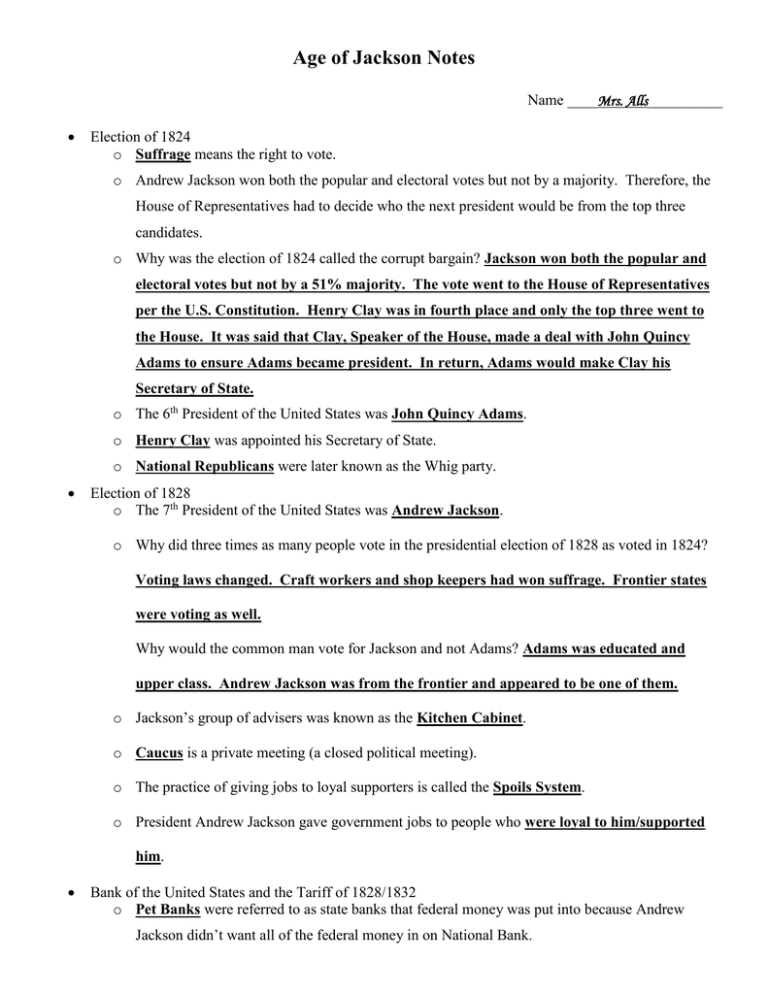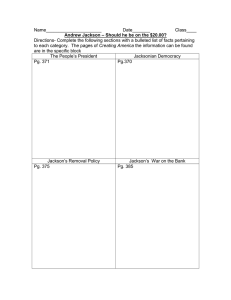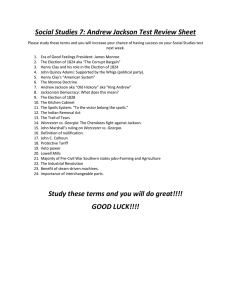Age of Jackson Notes
advertisement

Age of Jackson Notes Name ____Mrs. Alls__________ Election of 1824 o Suffrage means the right to vote. o Andrew Jackson won both the popular and electoral votes but not by a majority. Therefore, the House of Representatives had to decide who the next president would be from the top three candidates. o Why was the election of 1824 called the corrupt bargain? Jackson won both the popular and electoral votes but not by a 51% majority. The vote went to the House of Representatives per the U.S. Constitution. Henry Clay was in fourth place and only the top three went to the House. It was said that Clay, Speaker of the House, made a deal with John Quincy Adams to ensure Adams became president. In return, Adams would make Clay his Secretary of State. o The 6th President of the United States was John Quincy Adams. o Henry Clay was appointed his Secretary of State. o National Republicans were later known as the Whig party. Election of 1828 o The 7th President of the United States was Andrew Jackson. o Why did three times as many people vote in the presidential election of 1828 as voted in 1824? Voting laws changed. Craft workers and shop keepers had won suffrage. Frontier states were voting as well. Why would the common man vote for Jackson and not Adams? Adams was educated and upper class. Andrew Jackson was from the frontier and appeared to be one of them. o Jackson’s group of advisers was known as the Kitchen Cabinet. o Caucus is a private meeting (a closed political meeting). o The practice of giving jobs to loyal supporters is called the Spoils System. o President Andrew Jackson gave government jobs to people who were loyal to him/supported him. Bank of the United States and the Tariff of 1828/1832 o Pet Banks were referred to as state banks that federal money was put into because Andrew Jackson didn’t want all of the federal money in on National Bank. o Quote: In the early 1800s, as industry in the North expanded, it looked toward southern markets, rich with cash from the lucrative agricultural business, to buy the North’s manufactured goods. However, it was often cheaper for the South to purchase the goods abroad. In order to provide protection for northern industries, the Jackson administration placed a tariff on many of the imported goods that could be manufactured in the North. o Andrew Jackson- feared that both the federal government and the Supreme Court are too powerful – defended states’ rights, especially the right to hold slaves – favored the removal of all Native Americans from lands east of the Mississippi River. What viewpoint did Andrew Jackson hold on the issue of a national bank during the presidential campaign of 1828? Jackson believed the bank was unconstitutional. Why did manufacturers in the United States welcome the 1828 tariff on manufactured goods from Europe? The tariff made European goods more expensive, and American consumers were more likely to buy American-made goods. o The Nullification Crisis was triggered by strong opposition to the Tariff of Abomination. An abomination is something that is hated. (nullify = to cancel) o Explain the Nullification Crisis: ___________________________________________________ ______________________________________________________________________________ ______________________________________________________________________________ ______________________________________________________________________________ o “Our Federal Union --- it must be preserved.” – Andrew Jackson Some people refer to the national government as the federal government. o Secede means to withdraw from the Union. o What does the cartoonist want readers to think of President Jackson? What symbols does the cartoonist use to suggest kings and queens? What symbols are used to represent the United States? How does the cartoonist use labels and captions? Explain how the title “King Andrew” was or was not a valid title for Andrew Jackson during his reign as president. Trail of Tears o Native Americans were hurt the most by Jackson’s removal policy. o In 1832 Chief Justice John Marshall ordered state officials to honor Cherokee property rights. President Jackson refused to support the decision. “Marshall has made his decision, now let him enforce it!” – from G.B. Tindall, America: A Narrative History. o The Women’s Rights’ movement first began Seneca Falls, NY in 1848 with the idea of getting more rights for women in voting, participation in government, ownership of property, and jobs. o Women finally won the right to vote with the 19th amendment in 1920. Election of 1836 o The 8th President of the United States was Martin van Buren. Panic of 1837 o This led to a depression. Election of 1840 o William Henry Harrison was known as Tippecanoe after his defeat of the Native Americans there. o Why wouldn’t people have known during this time that Harrison wasn’t what he was portraying? news didn’t spread as rapidly as it does today o John Tyler was the first Vice-President to take over the office of President without being elected. Review Notes What are the “enumerated” powers of the federal government? Declare war, coin money, and regulate interstate and foreign commerce What are the qualifications for holding the office for a Senator? At least 30 yrs, US citizen for 9 yrs, resident of state elected Who brought tobacco to Jamestown? John Rolfe What was the lawmaking body of Virginia called? House of Burgesses What were the laws passed by England to limit America’s trade and to help them make more money? Navigation Acts A system set up in which the colonies sole purpose was to make money for England was called mercantilism. What did the Proclamation of 1763 do? Forbade colonists from moving west of the Appalachian Mts. The writers built safeguards into the Constitution so one branch could not dominate the others. This is called checks and balances. The compromise between the New Jersey Plan and the Virginia plan was called the Great Compromise. John Locke believed that people had a natural right to life, liberty, and property. Both the federal and state government have the powers to tax. People who favored the Constitution were called Federalists. Favored by most large-states delegates; representation would be based on population – Virginia Plan What was the solution for counting enslaved persons towards representation in the states? 3/5ths Compromise What act increased the time required to become a citizen of the U.S. from 5 to 14 yrs.? Naturalization Act Which amendment gave women the right to vote? 19th Which amendment lowered the voting age from 21 to 18? 26th What treaty allowed American ships to use the lower Mississippi River and the port of New Orleans? Pinckney’s Treaty





